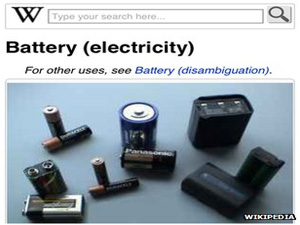



Date:24/04/12
 Poorly coded websites are causing smartphone batteries to drain more than necessary, research has suggested. A team at Stanford University compared the energy consumption of leading websites including Wikipedia and the Internet Movie Database.
Poorly coded websites are causing smartphone batteries to drain more than necessary, research has suggested. A team at Stanford University compared the energy consumption of leading websites including Wikipedia and the Internet Movie Database.
Tests were run using an Android smartphone, with Google Mail declared as the "greenest" mobile site tested. Last month, research showed that free mobile apps were also overly draining battery power.
Power drain
The findings blamed built-in systems for retrieving and displaying advertisements with the app. However, these more recent tests on mobile websites blamed poor coding choices for the higher-than-neccessary consumption.
"Despite the growing popularity of mobile web browsing, the energy consumed by a phone browser while surfing the web is poorly understood," the report said.
"We hope this paper demonstrates the importance of building a mobile site optimised for mobile devices.
"Sites who do not, end up draining the battery of visiting phones. This can potentially reduce traffic to the site."
The researchers revealed that by analysing and tweaking the design of Wikipedia, energy consumption could be reduced by 30% - without affecting the user experience.
The report added: "Our results show that for popular sites, downloading and parsing cascade style sheets and Javascript consumes a significant fraction of the total energy needed to render the page."
Power-hungry
Other tweaks suggested by the report include using the .jpeg image format instead of other file types like .gif and .png. Apple.com came out worst in the test - but this is largely due to the site not having a version optimised for mobile use.
Google's email offering Gmail was declared the most efficient site in the findings, a fact credited to its use of HTML for key functions rather than the more power-hungry Javascript.
"Our experiments suggest that using links instead of Javascript greatly reduces the rendering energy for the page," the researchers said.
"Thus, by designing the mobile version of the site differently than its desktop version, Gmail was able to save energy on the phone."The research is to be presented at the World Wide Web 2012 conference in Lyon this week.
Poorly designed mobile sites 'drain smartphone battery'
 Poorly coded websites are causing smartphone batteries to drain more than necessary, research has suggested. A team at Stanford University compared the energy consumption of leading websites including Wikipedia and the Internet Movie Database.
Poorly coded websites are causing smartphone batteries to drain more than necessary, research has suggested. A team at Stanford University compared the energy consumption of leading websites including Wikipedia and the Internet Movie Database.Tests were run using an Android smartphone, with Google Mail declared as the "greenest" mobile site tested. Last month, research showed that free mobile apps were also overly draining battery power.
Power drain
The findings blamed built-in systems for retrieving and displaying advertisements with the app. However, these more recent tests on mobile websites blamed poor coding choices for the higher-than-neccessary consumption.
"Despite the growing popularity of mobile web browsing, the energy consumed by a phone browser while surfing the web is poorly understood," the report said.
"We hope this paper demonstrates the importance of building a mobile site optimised for mobile devices.
"Sites who do not, end up draining the battery of visiting phones. This can potentially reduce traffic to the site."
The researchers revealed that by analysing and tweaking the design of Wikipedia, energy consumption could be reduced by 30% - without affecting the user experience.
The report added: "Our results show that for popular sites, downloading and parsing cascade style sheets and Javascript consumes a significant fraction of the total energy needed to render the page."
Power-hungry
Other tweaks suggested by the report include using the .jpeg image format instead of other file types like .gif and .png. Apple.com came out worst in the test - but this is largely due to the site not having a version optimised for mobile use.
Google's email offering Gmail was declared the most efficient site in the findings, a fact credited to its use of HTML for key functions rather than the more power-hungry Javascript.
"Our experiments suggest that using links instead of Javascript greatly reduces the rendering energy for the page," the researchers said.
"Thus, by designing the mobile version of the site differently than its desktop version, Gmail was able to save energy on the phone."The research is to be presented at the World Wide Web 2012 conference in Lyon this week.
Views: 1167
©ictnews.az. All rights reserved.Similar news
- The mobile sector continues its lead
- Facebook counted 600 million active users
- Cell phone testing laboratory is planned to be built in Azerbaijan
- Tablets and riders outfitted quickly with 3G/4G modems
- The number of digital TV channels will double to 24 units
- Tax proposal in China gets massive online feedback
- Malaysia to implement biometric system at all entry points
- Korea to build Green Technology Centre
- Cisco Poised to Help China Keep an Eye on Its Citizens
- 3G speed in Azerbaijan is higher than in UK
- Government of Canada Announces Investment in Green Innovation for Canada
- Electric cars in Azerbaijan
- Dominican Republic Govt Issues Cashless Benefits
- Spain raises €1.65bn from spectrum auction
- Camden Council boosts mobile security





















